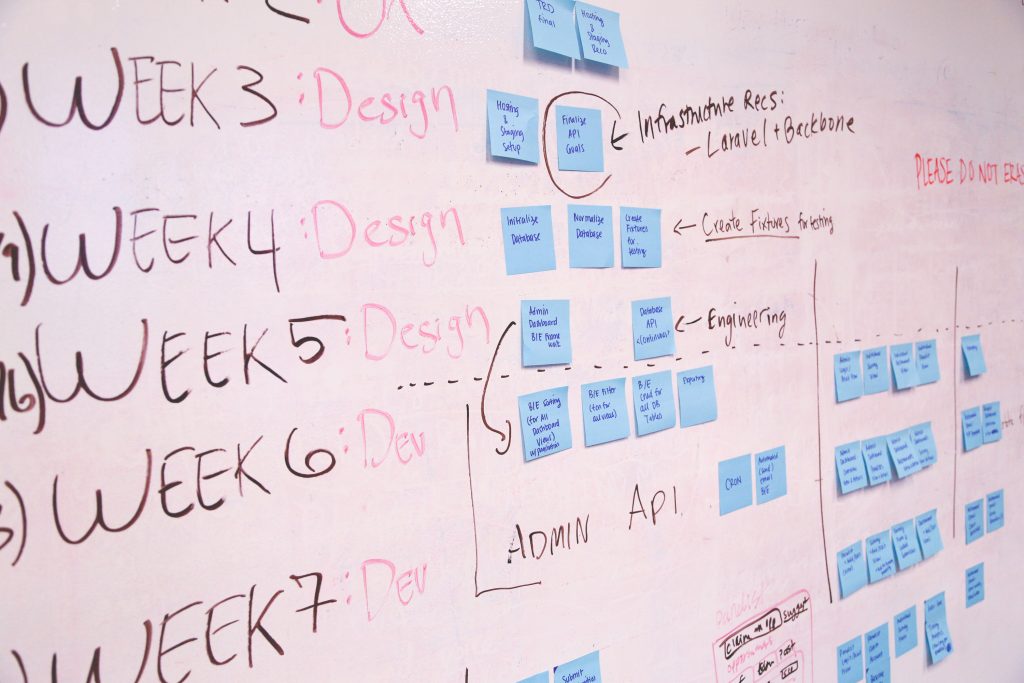
Do you often get stuck in ruts or have a hard time making decisions? Perhaps you get into analysis paralysis more often than you intend, or maybe you go through everyday motions without feeling like you’re moving forward? This is how you can get stuck in an unhealthy relationship for years, or work in a job for a decade before finally realizing you hated it all the time.
When a decision-making process is in the auxiliary, or what we like to call the Co-pilot position (Car Model), it takes conscious effort to engage it. Therefore, making a move can take forever and sometimes opportunities get missed because it does not come to us as naturally as our primary function, or Driver position. In this article, I want to talk about each of the decision-making (judging, not perceiving) processes and how they look when in the Co-pilot- or growth- position. These functions are Authenticity, Harmony, Accuracy and Effectiveness. Since I’m an INTJ, it’s only natural that I start this series with my own Co-pilot, Effectiveness.
The technical name for “Effectiveness ” is Extraverted Thinking, and it values sustainable systems, milestones and measurable information. In other words, it’s the ‘get shit done’ process. It gets things checked off the to-do list and makes sure you are meeting your goals. Since it’s in the Co-pilot position for both INTJs and ISTJs, it is a source of growth for us.
A Pitfall:
It seems easy to just leave it at that, right? Go do stuff! The thing is, there’s another process intertwined with it that can bring help or harm. This process is “Introverted Feeling,” or what we’ve nicknamed  “Authenticity.” This process is all about what feels right for us, what’s ethical, and what feelings are showing up. Every Effectiveness Co-pilot is always coupled with Authenticity in the 10 Year Old position. This means that we can sometimes get stuck in our feelings. The worst part is that, sometimes, that stuckness can pull us away from our Effectiveness process. It’s a constant push and pull, like the sea, and getting into our Co-pilot helps us bring in the tide. While Authenticity can feel nice and soothing at times, less nourishing water is available to us and there’s a risk of drought.
“Authenticity.” This process is all about what feels right for us, what’s ethical, and what feelings are showing up. Every Effectiveness Co-pilot is always coupled with Authenticity in the 10 Year Old position. This means that we can sometimes get stuck in our feelings. The worst part is that, sometimes, that stuckness can pull us away from our Effectiveness process. It’s a constant push and pull, like the sea, and getting into our Co-pilot helps us bring in the tide. While Authenticity can feel nice and soothing at times, less nourishing water is available to us and there’s a risk of drought.
Develop Your Co-Pilot:
So how exactly can we get into our Effectiveness process? I often hear others ask this question and people come up with very simple, straightforward answers. “Buy a daily planner! My ISTJ friend relies on it!” Or “My INTJ husband uses a color-coding system!”
Do you think this is all there is to the Effectiveness process?
I say the root of the problem is not being addressed. We need to ask WHY it’s difficult to get into our growth state. The answer lies in our tertiary, Authenticity.
What we need to do is not just go for socially-approved, arbitrary means of planning or what others think Effectiveness is. We need to do what feels right for us. Feed the 10 Year Old so they stop complaining, and then you can go do your business.
This means that you need to create the right system for you. What milestones do you think in naturally? Do you actually care if you start something by 9:30am? Are there particular events you prioritize? What things are most meaningful to you? What are the things you wish to do before you end up on your deathbed? What is the right path in the long run?
These are the questions you’ll need to answer before you can form your own authentically personal system. When it’s totally right for you, it will be sustainable.
And hey, maybe a daily planner DOES work for you. Maybe it doesn’t. That doesn’t make you any less INTJ or ISTJ. It means that you know what works for you and that’s a good thing.
I suggest doing some research. Try different organization techniques. Consult the people around you and see if they have ideas you hadn’t considered. Take in the options and design your own process by piecing methods together or by  making your own from scratch.
making your own from scratch.
If you tap into your Effectiveness process well, you’ll be able to maintain a stable source of energy and you’ll meet the meaningful goals that pertain to your life’s purpose.
When you really know what method works the best for you, you’ll be unstoppable.
Tangible actions:
- Read 7 Habits of Highly Effective People by Stephen Covey. This book is all about building sustainable systems in your life to meet your long-term goals no matter what your circumstances.
- Freewrite on a blank piece of paper. When you organize it, think about how you normally break apart information. Is it by steps? By ideas? By dates? By roles? This is probably the way you need to sort your goals as well.
- Start big and end small. Don’t think of what you’re going to do tomorrow or how you’ll organize your closet. Take those big dreams you have and see how you can break them down into manageable tasks that can be placed on a to-do list. Example: I want to write at least one novel in my life, so I will write 30 minutes everyday on 750words.com. Every Saturday, I’ll take an hour to learn about a particular writing technique to focus on for the following week of writing. Once I hit 50,000 words, then I’ll go into an editing phase for 30 minutes per day.
- Try on different systems for size. See how they fit. Do the daily planner thing and see if it’s right for you. Use blank paper. A graphic organizer. A digital app like Endnote. A whiteboard. Get into short-term relationships (or even casual one-night-stands) with these methods to sense their flavor. And if they mesh well with your own savory hue, then add it to your collection. If it’s a maybe, then perhaps it needs more of your own personal spice. Tweak it to your needs. Use only the necessary bits and pieces for specific occasions.
- Delegate a part of a project you’re currently working on to one of your friends. If you have a blog, invite your friend to write an article and set the parameters around it. This helps you set up a system that others can understand and creates milestones for both you and your team. It can be as small as explaining to your friend what kind of picture you’d like them to take. For example, I basically take a picture of them, show it to them, and say “That’s how I want you to do it. See this angle? And how the light hits?” Or it could be more in-depth like asking someone close to you to research something for you if you haven’t got the time to do it in that moment.
Decisions, Decisions…
Sometimes as tertiary Authenticity users, we can confuse what feels right with what feels good. It’s better to focus on what will be most effective in the long-term so we can make our best decisions.
As an INTJ, I tend to use pro/con lists most often. For example, my most recent relationship ended because I asked myself this: What are the benefits of staying in this particular situation? What positive or negative things would happen if I left? I made a list of each factor and used the 80-20 metric. It ended up looking a bit like this:
Pros
- We communicate well together
- He helps inspire me to be more proactive
- He cares a lot about me and respects me (because feminist men are awesome!)
Cons
- I have become a bit dependent on him.
- I feel too anxious and insecure in this relationship.
- I need more healing to do before getting into a long-term relationship because I don’t have enough to offer at the moment.
- My needs don’t match up with what he’s willing to give.
- This is long-distance and while I’m willing to commit to that, there is no mutual, concrete end-goal to look forward to.
- Our five-year trajectories into the future don’t match up.
- There’s no guarantee that we will be able to be physically together.
- Our communication recently has become too synthetic and in-genuine.
I decided that since about 80% of what I came up with indicated that leaving was best, then so be it. I planned for the breakup, anticipated what emotional turmoil might pop up and took measures to combat these things.
And did you notice that my Authenticity process snuck in a few words?
“I feel too anxious and insecure in this relationship.” Imagine if I didn’t bother making this list! What if the pros actually outweighed the cons and I totally made a drastic decision based on my insecurity! If I broke up with this guy in that way, I would have never known what could be and would spend the rest of my life second-guessing.
But because I was able to lay all of the elements on the table, I made an objective decision and will remember the reason why we broke up for the rest of my life. I sent him an email detailing these things and it was a calm endeavor. We still talk occasionally and there are no hard feelings because I was able to communicate my reasoning for wanting to part ways. We were able to talk it through and make a mutual decision about it.
If 80% of my list had more pros, I would’ve planned for the problem-solving. Maybe we would need therapy or a fresh perspective on things. Maybe I needed to do some changing and it was me who needed to open up and be more available to my partner. Don’t let your feelings get in the way. They can be a good source of guidance to lead you to possible options and solutions, but do not give them permission to make the decisions.
For ISTJs, I suggest being open to new experiences and then analyzing it in retrospect. Maybe there’s a new coworker and you’re concerned that they won’t do a good job. Test it out in real time. Work with them and delegate a few small tasks to see how they handle them. Make sure you keep an open line of communication during this process! Don’t let your feelings control your reactions. Speak up and problem solve. If your co-worker was late or forgot an important file, ask why. Don’t just assume the worst of them because that’s giving your Authenticity process permission to make decisions for you. Get that outside feedback so you can have a clear view of what’s going on. After maybe two weeks, think about what happened as objectively as possible. What kinds of challenges did this coworker face? Were they actually  incompetent as an employee, or are they just getting used to the new job? Were they doing their best to get the tasks done? Did their accomplishments outweigh their mistakes? Just as I mentioned for INTJs, let your Authenticity process guide you to possible conclusions, but do not let it make the final judgement.
incompetent as an employee, or are they just getting used to the new job? Were they doing their best to get the tasks done? Did their accomplishments outweigh their mistakes? Just as I mentioned for INTJs, let your Authenticity process guide you to possible conclusions, but do not let it make the final judgement.
Use any method in your arsenal that you think might work. Try a graphic organizer, consult your friends, write yourself an essay about the situation and try to view things as objectively as possible. What are the facts? Uncover them, list them, weigh them, and then decide.
Final notes:
As you’re deciding on which effective method is best for you, make sure you’re not avoiding certain things just because it feels hard or uncomfortable. It might take you a few tries to really find that sweet spot. Whatever method you choose, it must be flexible. Don’t let the plans run you, and don’t let the emotions call the shots. Effectiveness is all about long-term sustainability. So making sure the activities on your checklist are right for you and the decisions you make thoroughly thought through is an essential part of the process.
Want to learn more?
Discover Your Personal Genius


Share:
Harmony: The Secret Weapon of the INFJ
Patterns and Causes of INFJ Wounding
38 comments
Nice article Clesea. I am also INTJ.
I used to think myself as INFJ since various assessment reported me as INFJ instead of INTJ. When I used to read the description of INFJ profiles I noted some of the stuff is not relevant to myself, particularly, Fe and Ti in the cognitive stack of INFJ. But the PH assessment reported me INTJ and when I read description I totally understood that this is most relevant to me.
One of the possible reasons that I was reported as INFJ, as per my limited knowledge of MBTI, was that I was in the Ni+Fi loop and the other assessment test were reporting me as INFJ. After introspection about my past life I can easily find many incidents where I was in the grip of Ni+Fi loop and behaved foolishly which was not understandable. The intensity of emotions hijacked my Effectiveness and Perspectives Functions and I was making decisions by Authenticity Function disregarding whether the end results will be contributing to my long term goals or not. I was doing was “feels good” instead of what “feels right”. On several occasions I made stupid decisions which were regrettable by myself and others.
My Authenticity Function was so much out of control that my friends pointed out that I need to take care of it. I went through emotional intelligence assessment and coaching to understand why I am doing what I am doing to bring my life under control. It helped me understand that my life was on “auto-pilot” and being run by Authenticity Function. Later, I went through Enneagram personality assessment and I consistently came out as Type 1 which was quiet consistent with my personality INTJ 1. Some of the authors described that usually INTJs fall in Enneagram 5w4 because of their functional stack of Perspectives + Effectiveness but some INTJs fall in Enneagram 1 because their Authenticity (Fi) Function is very dominant. That was great revelation for myself to understand why I was making stupid decisions in my life and why my life was out of control.
I have taken few concrete actions to bring my Effectiveness Function back into its natural place. I read David Allen’s book Getting Things Done and following the GTD methodology in my work life and also I read Four Hour Work Week by Tim Ferris to generally bring my life into right directions. Few things worked for me and few did not. I am still work in process.
I think Anna got it bang on when she wrote…
I often think being more effective makes me a happier individual. Except I get depressed often. I’ve heard in the past that INTJ’s are emotionally immature and that’s very true for myself. Because of this, when it comes to planning I make my mental health my priority. If I am not okay emotionally I am not effective. Does anyone have any suggestions (links or articles) that could help this young INTJ to handle her emotions so she can move on with being more a more effective individual?“That there’s significantly more value in addressing the problem from the source because I find, in my own experience, that INTJ’s don’t stop doing things because they don’t know how. They stop because emotionally, something’s come up and they simply don’t know how to handle it.”
Also, how can I address the problem from the source if I’m not exactly sure what’s bothering me?
I just realize I’m an INTJ and my whole world view collapse. I guess I’m late. I really want to be an INTP.
INFP looking for 3 year old “effective” exercises to do in times of stress and this article was really useful
I agree with Anna. I ask that you ,Antiona and Joel do a post on our fi. There a lot of post on the ni,ti loop. There needs to be one on the ni, fi loop.. Loved the post on enneagram and check it out. 5w4 I check out when I’m going to my stress points. 7 stress point is my se. 2 stress point is my 10 year old. And I can tell you I do not like myself very much in this state of being. My 5 enneagram point does real well when I go to 8 getting out of my head and engage physical application and body awareness. My 4 fi goes to 1 bring back to awareness of self discipline and organization of my physical environment. We are sent here to become entergade and whole. Thanks for your article. Reading between the lines Fi needs to be addressed in all Intj and Istj.